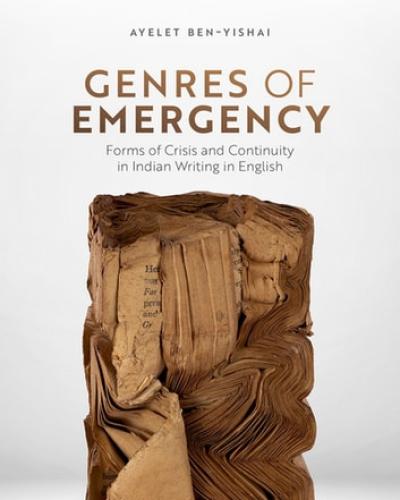This iteration of the Fellows’ Q&A series features Ayelet Ben-Yishai, Chair of the Department of English Language and Literature at the University of Haifa and 2017-18 “Corruption” Society Fellow. Her new book, Genres of Emergency: Forms of Crisis and Continuity in Indian Writing in English, was released in February 2023 from Oxford University Press.
Big Picture
The broadest, most abstract question driving this book has to do with the relationship between fiction and politics. Does fiction merely represent the political world, or can it also intervene in it? The specific form this question takes in my book was motivated by a cluster of Anglophone novels written in English during the last two decades of the twentieth century, all of which focused in diverse ways on the State of Emergency imposed by Indira Gandhi in India in 1975-77. Why, I wondered, did the Emergency keep resurfacing in Anglophone fiction, long after the Emergency had ended and had been all but forgotten as a minor anomaly in India's democratic record? What were these novels trying to achieve by their repeated return to the Emergency and its themes?
One focus of the book, predictably, is the legal-political “emergency” and Gandhi's authoritarian State of Emergency (known in India as "the Emergency"). The other focus, less predictable and thus more exciting, is genre, namely the various fictional and non-fictional genres in which the Emergency was written into Indian culture. The two, I show, are intimately connected. In "writing Emergency" the writers of these texts were trying to come to terms with a momentous, if far-too-quickly forgotten period of Indian history (capital E Emergency). At the same time, this writing was trying to conceptualize emergency (with a small e) as a political category. The fact that these writers were hewing closely to already well-established fictional genres (realism, epic, allegory, thriller) clues us into genre's ability to mediate between established conventions and that which aims to upend them. Most importantly, genre here becomes a mode of action – a way for fiction not only to represent the political world but also to intervene in it. Genres of Emergency thus brings together literary form with politics, sociology, and history to show how the Emergency functions simultaneously as exceptional and non-exceptional (the “crisis and continuity” of the subtitle), unexpected and yet familiar.
In Particular
The first part of the book offers a cultural history of Emergency discourse, mostly non-fiction, written during the Emergency. I open with a virtually unknown and, frankly, badly-written and boring prison diary I found in the Cornell Library stacks. It was written by Shanta Kumar, a politician from the Hindu right, who spent the Emergency under administrative detention. The prison memoir is an important Indian genre, intimately tied to the freedom struggle from colonial rule. I thus initially approached the memoir with sympathy, thinking I was going to encounter a freedom-fighting dissident quashed under Gandhi's authoritarian rule.
And indeed, Kumar establishes himself in the long lineage of political prisoners in Indian colonial and postcolonial history, in the vein of Mahatma Gandhi. In a characteristic passage he writes:
On the burning flame of the nation, a few patriots have always sacrificed themselves like the proverbial patanga [moth]. The history of the country was written on the heroic acts of those few patriots.… I was flying high on the wings of patriotism.
However, Kumar’s politics position him very differently. He was a member of the Bharatiya Jana Sangh, forerunner of today's ruling Bharatiya Janata Party (BJP) party, and an operative of the Rashtriya Swayamsevak Sangh (RSS), a powerful Hindu nationalist organization. In the early decades of independence, the RSS, staunchly anti-secular and anti-Congress, was maligned and marginalized, even banned in 1948 after one of its former members assassinated Mahatma Gandhi over his alleged pro-Muslim stand over Partition.
Kumar thus creates a hitherto unthinkable continuity between Mahatma Gandhi and an RSS operative, casting the first 28 years of Indian independence as a state at odds with its nation. And so, while the diary does not lay out much of a political agenda, it masterfully uses the genre of the prison memoir to recast Kumar and fellow detenus as Gandhi’s successors, patriotic fighters for a free India, fighting against an illegitimate state. Doing so, he enables his – and his party's – move from the scorned margins of Indian politics to its center.
Emergency detention was — as it remains world-wide to this day — undoubtedly an anti-democratic political practice under whose auspices extreme state violence, including torture, were carried out. At the same time, it also here afforded — as it did for the earlier colonial-era detenus — a political boon to a certain class of prisoners, whose incarceration paved their way to a political career. While I am in no way arguing that Kumar or other detenus welcomed the Emergency or their imprisonment under its regime (they most emphatically did not), I do want to argue that the anti-colonial struggle for independence had supplied them with a political template, one which they — to a certain extent unknowingly —exploited for their individual and political gain.
Discovery
The most unexpected part of this book was how central genre became to its argument. The early conceptualization of the project focused on how emergency represents at once both crisis and continuity. Looking at genre began somewhat arbitrarily, with the pragmatic decision to organize the 12 novels I was analyzing into chapters by their dominant genre: Realism, Epic, Allegory, and Thriller. Once they were organized in this way, I began to recognize that genre was substantive. A genre is a set of socially-agreed-upon conventions that have coalesced into a category. It combines the singular and the general, where each individual text is unique but draws on a series of conventions that make it understandable as part of a category. Here Emergency novels use the conventions of realism, epic, allegory, and the thriller to reach back in time and across cultures and languages, invoking past iterations of these genres and histories and anticipating those to come. And so, my case study of India’s Emergency fiction unexpectedly became a paradigm for thinking about emergencies world-wide via the genres – literary and non-literary – in which they are written.
Most surprising was my even later realization that the Emergency itself needs to be understood in terms of genre. The last stages of writing Genres of Emergency coincided with a global emergency in the form of the COVID-19 pandemic. Writing under lock-down at home, the connections between my research and my surroundings became clear. I understood that emergencies are not only similar to past emergencies but that they are constructed on a template of "emergency," a structure within which an individual event could be comprehended despite its ostensible singularity.
As I wrote the conclusion to my book, the COVID-19 pandemic, then two years old, had become the new normal, and with it the realization that the problem of thinking about the state-of-emergency as genre is normalization. The paradox of genre is that it is necessary for comprehension; we cannot understand an event without understanding what kind of event it is. But once an event becomes an event of a certain kind, then it loses its singularity, and hence its meaning as crisis: it becomes normalized. Once identified and declared, an emergency brings about an array of generically-determined actions and reactions that seem inevitable and necessary. These in turn further normalize the state of emergency.
Fellowship
Written over nine years, my book bears the indelible marks of the many places in which it was conceived, talked about, researched, written, and rewritten. Situated at the midpoint of this protracted project, my year at the Society stands out as the time and place where the book gelled, where it became a thing in the world. The Society, Cornell, and Ithaca seeped into its pages not so much because of their stunning beauty and the perfect writing conditions (though there was a lot of that as well – thank you, Paul, Paula and Emily!) but because of the people who were there with me, as hosts, colleagues, students, or fellow travelers. Indeed, the book owes much to the brilliance, intellectual breadth, and camaraderie of our cohort and its incredibly productive group writing sessions. Also crucial was the diverse and generous community of scholars I met through the Cornell South Asia Program, the wonderful library collections, and the brilliant students who joined for a semester long journey through Indian fiction in English.
More concretely, I think that our weekly "corruption" seminar was vital in analyzing the way that corruption is depoliticized in contemporary discourse. Rather than regard "corruption" as merely a crime or social scourge to be eradicated, I learned to think of it as an index for a complex political structure. This allowed me to recognize the ways in which the contemporary Indian social and political map owes much to the de-politicization of public discourse towards more neutral-seeming domains of the economy, law-and-order, anti-corruption, and other forms of public respectability, a de-politicization that ultimately legitimized the Hindu right within the mainstream middle class and in its politics. In contrast to this depoliticized discourse, I argue, Indian fiction in English became increasingly aware of its modes of political engagement, re-politicizing the Emergency through its sophisticated deployment of genre. In other words, rather than thinking about emergency as a state of exception or anomaly, the novels use the conventions of their genre to contextualize it within a dense historical background, re-inserting the Emergency into India's history and future and, thus, bringing it to bear on fraught questions of caste, class, gender, and corruption in India's past, present, and future.






